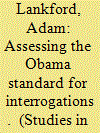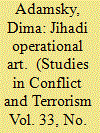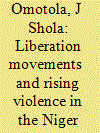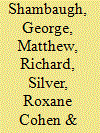|
|
|
Sort Order |
|
|
|
Items / Page
|
|
|
|
|
|
|
| Srl | Item |
| 1 |
ID:
094763


|
|
|
|
|
| Publication |
2010.
|
| Summary/Abstract |
On 22 January 2009, President Barack Obama issued an executive order that banned harsh interrogations and restricted legal methods to those listed in Army Field Manual 2-22.3. However, there remain concerns that the field manual may fail to prevent the continued abuse and torture of detainees. This study reexamines the leading social-psychological explanations for torture at Abu Ghraib to determine whether the manual appears sufficient to prevent future torture. Findings suggest that it has significantly curtailed future risks; however, in order to help ensure that U.S. soldiers' treatment of foreign detainees is consistently humane, additional steps should be taken.
|
|
|
|
|
|
|
|
|
|
|
|
|
|
|
|
| 2 |
ID:
094762


|
|
|
|
|
| Publication |
2010.
|
| Summary/Abstract |
Western scholars of jihadi strategic studies traditionally concentrate either on ideological-strategic or on tactical questions. This intellectual disposition overlooks operational art-an important layer of knowledge between strategy and tactics. Despite the absence of the term from classical jihadi literature, the discourse in the Salafi jihadi strategic studies community is replete with discussions related to it. Neither "small strategy" nor "grand tactics," operational art is a separate domain of knowledge. It serves as a framework for formulating principles of war, concrete fighting doctrines and integrates ends, methods, and means across all spheres of war-fighting. This article contributes to the Western scholarly understanding of Salafi strategic behavior by outlining a research program that will follow this overlooked development in jihadi military thought.
|
|
|
|
|
|
|
|
|
|
|
|
|
|
|
|
| 3 |
ID:
094765


|
|
|
|
|
| Publication |
2010.
|
| Summary/Abstract |
The contest for the 'soul' of oil and its revenues in Nigeria have thrown up several actors representing diverse interests, most notably the stale, oil multinationals and oil-hearing communities. This paper is primarily concerned with what it called the new contentious site of oil and environmental polities in the Niger Delta. The contention revolves mainly around the interpretations ascribed to the current but unprecedented wave of violence in the region by the contending forces in oil and environmental politics. In the reading of militias' activities, there is a simultaneous convergence and divergence between the state and the oil majors. Both refuse to attribute rising violence to liberation struggles, as claimed by the militants. They, however, differ over the best tactical approach to the problem. The oil majors seem to prefer a more violent approach to taming the monster, which violence in the Niger Delta has become. This is in sharp contradiction to the states' preference for a relatively less violent approach. This 'new' disposition of the state makes it all the more interesting, given the fact that the Nigerian state is notoriously reputed for its excesses in the Niger Delta over dissent. Overall, rising violence in the Niger Delta represents the continuation of the resource struggle by another means. Notable criminal tendencies became inevitable due to the insensitivity of the government and in order to sustain the struggle.
|
|
|
|
|
|
|
|
|
|
|
|
|
|
|
|
| 4 |
ID:
094766


|
|
|
|
|
| Publication |
2010.
|
| Summary/Abstract |
The American policy landscape during the George W. Bush administration was shaped by a series of traumatic events that confronted the nation and people of the United States. These included the terrorist attacks of 9/11 in 2001, the anthrax attacks in the fall of 2001, military actions in Afghanistan and Iraq, Hurricane Katrina in 2005, the threat of a flu pandemic in 2005 and 2006, the 2007 Intergovernmental Panel on Climate Change reports, and the financial collapse of 2008. The results of the 2008 presidential election appear to be a rejection of the Bush administration's major policy responses to these events, but the variation in type and level of public support among different groups suggests a much more varied and dynamic portrait of America in turbulent times. Using a multiyear panel survey, an interdisciplinary team of political scientists and psychologists analyzed the behavior and political responses to the events by the American public. The findings suggest that even seven years after the events of 11 September 2001, people with higher levels of post-traumatic stress symptomatology related to 9/11 have significantly different interpretations of the threat of terrorism and the appropriate policy responses to it than do others. Perceptions of threat, the political salience of terrorism and other traumatic events, the level of support for political leaders and assessments of the government's actions vary over time and across different groups within society based on the psychological, political and social, and personal characteristics of the respondent. These results help to open the black box of aggregate public opinion by providing a detailed portrait of how psychological, social, political, and personal factors affected perceptions and political behavior during the George W. Bush administration.
|
|
|
|
|
|
|
|
|
|
|
|
|
|
|
|
|
|
|
|
|